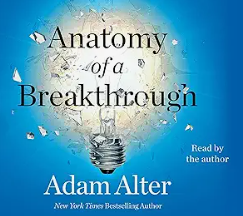When You’re Feeling “Stuck”
October 25, 2023. By Lori Patterson:
Feeling chronically ‘stuck’? I recently listened to author Adam Alter discuss his book Anatomy of a Breakthrough: How to Get Unstuck When It Matters Most where he mentioned the many possible reasons we may feel trapped or held back, and helpful ways to work around these mental road blocks.
Reasons we can get stuck often include striving for perfection, having too many options, and unwillingness to adjust when ideas are not working. A three-step approach is discussed by Alter, and it includes recognizing the emotional consequences of being stuck, knowing how to take small steps to remove the block, and then taking necessary action. Sometimes this means temporarily lowering the threshold of your work in order to move around the block, or taking a step back to reassess your path considering that perhaps the direction has slightly changed. Alter suggests that once you realize the ideas you do not want, your vision can become clear once more allowing you to pivot and attain your goal.
Consider a writer who is stuck, feeling stress in their writer’s block during a creative project. The writer may find relief in jotting down literally any idea that comes to mind and then slowly eliminating options he definitely does not want to include in the project…this can lead to new ideas as trailheads are explored. In another example, consider a scientist who has worked diligently to test a hypothesis. When having difficulty finding conclusive evidence, she may find value in changing direction completely if she allows herself to step back and assess research at an opposite end. The key element in both examples is that the individuals allowed space for reassessment.
Points to ponder:
- We often strive for perfection – Realize it isn’t always necessary. Determine which decisions require a longer time to contemplate; small decisions often do not require perfection every time.
- Making Decisions – We very often have too many options. An overabundance of available selections can cause a “analysis paralysis” and decision fatigue. Simplifying routine details can help avoid each. Again, not every decision needs a thorough thought process.
- Knowing when to stop or even quit when it’s just not working – Understand the difference between quitting and adjusting. Both are necessary options at times. Don’t quit immediately when a hardship arises but do recognize when the initial goal is no longer bringing you happiness or a meaningful result. We often avoid change for fear of the unknown, and criticize our own distress tolerance without reevaluating the results we are working toward or unknowingly creating.
How can we get unstuck? Focus on the goal but be kind to yourself by making changes when necessary. Re-examine your goals or intentions, perhaps they simply need to be altered slightly, or the direction you were going has changed dramatically. In either case, you may just need change of perspective to move forward. If you are feeling stuck in your current path, find comfort in knowing that you are able to redirect your thinking by doing small things to help achieve your goal, and don’t be afraid to pivot.

